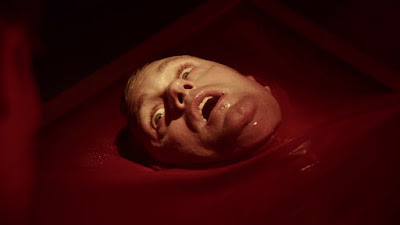 |
| All photos courtesy of Neon |
"I wouldn't normally do this, but I'm on vacation!" is a common sentiment expressed by individuals partaking in a bit of harmless hedonism on an excursion. Usually, this applies to overeating, imbibing in alcohol, and maybe even a bit of casual sex but nothing too harmful. Brandon Cronenberg's Infinity Pool (2023) takes this concept to the extreme and explores what can happen when self-gratification goes too far.
James (Alexander Skarsgård) and his wife Em (Cleopatra Coleman) are on vacation in a fictional, vaguely Eastern European seaside country. James is a novelist, but it has been years since his previous work due to the less-than-favorable reviews it garnered. One day he meets Gabi (Mia Goth), a commercial actress who also happens to be a fan of James' book. She and her husband Alban (Jalil Lespert) invite James and his wife out on a day trip outside of the safety of the resort grounds.
On the surface, Infinity Pool is about how rich Westerners go to other countries and exploit their need for tourism for pleasure. The land they are staying in capitalizes on their fetishization and embraces it, allowing visitors with enough money to brutalize the locals and continually generate clones to take their punishment instead. James ends up falling in with a group of such people, a collection of wealthy folks (including Gabi and Alban) who indulge in their basest desires, murdering whoever they want and having drug-enhanced orgies.
Every time they get caught, they buy doubles for execution. This ties into the title of the film in two ways. An "infinity pool" is a pool where the water isn't in a traditional container; it has a free edge. Often, they are constructed so that the pool's edge is lined up with the ocean's horizon giving the illusion of endless water. There are no boundaries. Second, infinity pools are insanely expensive to build and maintain and thus are only enjoyed in luxury spaces by affluent clientele. This particular group has made the country their infinity pool of blood.
As you dive deeper into the subtext, it becomes apparent throughout the film that James has developed, or perhaps discovered, that he has a humiliation kink. Infinity Pool has a taste for sado-masochism, but it focuses on the mental aspects more than the physical. James has a deep-seated desire to feel validated, not only as an artist but as a man, and his fragile masculinity is decimated throughout the film. Gabi fulfills many of his desires for sex, for nurturing, and inevitably, the weight of his actions takes a toll on his soul. Unlike his father, Brandon is more interested in the psyche's corruption than the physical body's corruption.
Infinity Pool is beautifully shot by cinematographer Karim Hussain who worked with Brandon on his previous films. The scenery is somewhat mundane but punctuated with kaleidoscopic surreal sequences with neon colors and nightmarish imagery. Tim Hecker's deep and dark synth score is ominous and foreboding, complementing the transgressive imagery perfectly. Compared to his previous film Possessor (2020), Infinity Pool feels much looser, more experimental, and, subsequently, less focused. The pacing sags a bit in the third act, but it manages to find its footing again to nail the ending. With every film, Brandon Cronenberg is finding his voice and stepping out of the shadow of his legendary father to forge his path.
--Michelle Kisner


